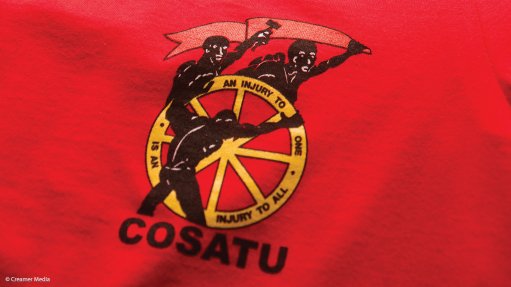
Photo by: Creamer media
The Congress of South African Trade Unions denounces the looting and the destruction of vital economic and community infrastructure in the province of KwaZulu- Natal and Gauteng. We call on law enforcement agencies to act purposefully to put the situation under control.
This lawlessness is spreading all across the country and needs cohesive leadership from all levels of government. Many workers will lose their jobs and many families will be left with no means of earning a living if this is not properly and speedily resolved.
The Federation is disappointed by the disjointed response from the 6th administration. Municipalities, provinces, and national departments have been caught off guard by this ensuing chaos. It is clear that our intelligence agencies are hopeless, and our law enforcement agencies have failed to build police partnerships with the communities they serve.
While the current events were triggered by political restlessness and frustration following the arrest of Former President Jacob Zuma, it is clear now that criminal elements have opportunistically hijacked this issue and are using it to loot.
This is also a reminder that the problem of unemployment and poverty is real in South Africa. COSATU has been arguing for a long-time that unemployment is a ticking time bomb that will explode in the face of policymakers and decision makers.
This is another reminder that millions of South Africans are hungry and unemployed. Since they have been systematically isolated from the mainstream economy and their survivalist economy is constantly sabotaged, they have reached a point where they feel they have nothing to lose. The crisis on poverty, inequality and unemployment cannot be explained away but needs to be addressed without fail.
We are disappointed by the ANC’s failure to provide leadership at this difficult time for the nation. The mixed messages from the elected political leaders at all levels of the organisation have sown confusion and been disappointing.
The Federation has written to both the ANC and the SACP to demand that a Special Alliance Political Council meeting be convened to discuss the current events. The Alliance needs to confront this matter because it cannot afford to be found wanting on these and many issues that are shaking and redefining our political landscape.
The absence of democratic, consensus-seeking consultation on the direction of our shared national democratic revolution has created a gulf of leadership affecting both the alliance and society as a whole. This has plunged the revolution into unchartered waters, an unacceptable situation of uncertainty and all manner of factional opportunism seeking to fill the void.
We reiterate our support for the democratic institutions, including the Constitutional Court and denounce any attempts to undermine and attack them in any way. But it has to be acknowledged that since the fifth administration, we have seen an increase in court interventions in areas that are meant to be the preserve of both the executive and the legislative arms of the state.
The courts have been forced to resolve many political disputes since the 53rd ANC National Conference that was held in Mangaung. By allowing the courts to become an arbiter in many of these political disputes, this has unintentionally dragged the judiciary into politics and has also created a leadership vacuum in society and in the ensuing chaos.
There is a need to deal with this dangerous reliance on courts for relief and leadership in the midst of glaring political leadership failures. The Alliance has a political responsibility to ensure that the courts are not a substitute for a revolutionary organisation and political discipline.
Though this might look like the consolidation of democracy and the strengthening of its institutions, it hides the real truth that South Africa has not successfully ensured the complete transformation of its legal fraternity.
Many old order practices, including discrimination, overt or covert, along the lines of race and gender, remain. In a factionalised political environment, where the judiciary is being used to outwit and defeat political opponents, we need to reflect on the dangers that come with ignoring or postponing the important task of transforming the Judiciary.
But thuggery and criminality cannot be justified in the name of Judicial transformation.
Issued by COSATU